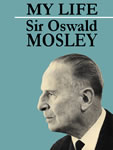My Life (Mosley autobiography)
This article needs additional citations for verification. Please help improve this article by adding citations to reliable sources. Unsourced material may be challenged and removed. Find sources: "My Life" Mosley autobiography – news · newspapers · books · scholar · JSTOR (October 2023) (Learn how and when to remove this template message) |
 | |
| Author | Oswald Mosley |
|---|---|
| Country | United Kingdom |
| Language | English |
| Genre | Autobiography |
| Publisher | Nelson |
Publication date | 1968 |
| Media type | Print (Hardback & Paperback) |
| Pages | 521 |
| ISBN | 0-17-142009-8 |
| OCLC | 245659224 |
My Life is the autobiography of the British Fascist leader Sir Oswald Mosley (1896 – 1980). It was published in 1968.
Background[edit]
Mosely was the most prominent British fascist leader of the 1930s, founding the British Union of Fascists in 1932. In 1939, following the start of the Second World War, the party was proscribed by the British government and in 1940 it was disbanded, and Mosely interned in prison until 1943, after which he was put under house arrest for the rest of the war.
After the war, Mosley made several unsuccessful attempts to return to political life, one such being through the far-right euro-nationalist Union Movement (1948-1973), but he had no successes.
Release[edit]
The book was published in 1968. To coincide with the release of the book, the BBC broadcast a Panorama special, seen by a record audience.[1]
Topics, themes and treatment[edit]
The book is structured as a sequential memoir, but it doubles as the author's personal defence against charges of antisemitism, as well as a general overview of world politics, both during his ascent, and at the time of its publication in the 1960s.[citation needed]
My Life provides a close-up view of England's ruling class from an immensely rich man born into long-established nobility, and married to the daughter of Lord Curzon. Mosley chronicles the social life of the elite, and he gives impressions of political figures across the spectrum, from Churchill and H. H. Asquith to Bernard Shaw and James Maxton as well as some of the top Nazis, though he tries to distance himself from Hitler.[citation needed]
References[edit]
- ^ Mosley, Diana (1977). A Life of Contrasts. Hamish Hamilton.
External links[edit]
| Organisations |
|
|---|---|
| Output | |
| In culture | |
This article about a biographical or autobiographical book on a British politician is a stub. You can help Wikipedia by expanding it. |
- Articles with short description
- Short description matches Wikidata
- Articles needing additional references from October 2023
- All articles needing additional references
- Use dmy dates from April 2022
- All articles with unsourced statements
- Articles with unsourced statements from October 2023
- Articles containing French-language text
- All stub articles
